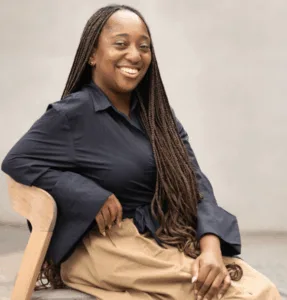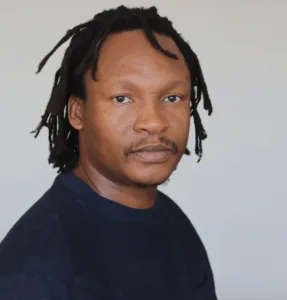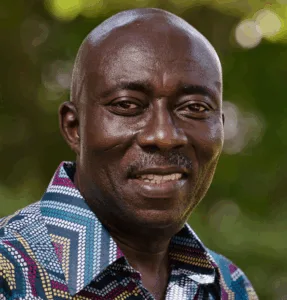Zeitz MOCAA presents a one-day symposium, One Must Be Seated, centring the work of Ghanaian-American artist Rita Mawuena Benissan in the context of her solo exhibition of the same name, that was on view at Zeitz MOCAA from 13 November 2024 to 19 October 2025. The event also marks the unveiling of a new site-specific Atrium commission by the artist, titled The Procession (2025).
Deeply rooted in her Ghanaian culture, Benissan’s practice has particular focus on the reimagining of the royal umbrella and stool, symbols of Akan chieftaincy, and the broader cultural traditions of Ghanaian royalty. The exhibition One Must Be Seated explores the process of enstoolment, the ritual installation of a new chief, akin to a coronation; a call to take their rightful seat in the stool that has been chosen for them.
Through tapestry, sculpture, photography and video, Benissan highlights and celebrates the rich traditions of Ghanaian culture, with particular attention to Asante customs. Her new site-specific commission, The Procession embodies the essence of traditional processions which honour chiefs and traditional leaders. Spanning the full height of the museum’s Atrium, the work combines vivid colour, depiction of community, and motifs of seagulls and palm fronds to evoke collective reverence.
Zeitz MOCAA invites you to join us for a gathering that will include a keynote address by Professor Kwasi Ampene, followed by a conversation between the artist and writer Dr George Mahashe. The programme will conclude with the unveiling of the Zeitz MOCAA Atrium commission and the launch of the One Must Be Seated exhibition publication.
Date & Time
Saturday, 8 November 2025
10.30 am – 5 pm
Venue
Zeitz MOCAA Scheryn Arena, Members Lounge and Atrium bowl
MC
Inshaaf Jamodien, Curatorial Assistant at Zeitz MOCAA
About the One Must Be Seated Publication
Launched on the occasion of the exhibition One Must Be Seated, the publication offers critical reflections on the practice of Ghanaian-American artist Rita Mawuena Benissan. It features thought-provoking essays by cultural practitioner and curator Ekow Eshun, writer and art historian Nana Oforiatta Ayim, and artist-curator Dr George Mahashe, alongside an introduction by Beata America, curator of the exhibition. The publication is designed by Daniel Rautenbach.
Programme
10:30 – 11:00 | Guest arrival
Coffee, tea and refreshments served
11:00 – 11:15 | Welcome
Welcome Address by Beata America
(Assistant Curator)
11:15 – 11:30 | Unveiling
Unveiling of the Zeitz MOCAA Atrium Commission
Remarks by Dr Greer Valley
(Senior Curator & Head of Curatorial Affairs)
11:30 – 13:00 | Discussion
Discussion between the artist Rita Mawuena Benissan and writer Dr George Mahashe
Moderated by Beata America
Followed by Q&A
13:00 – 14:30 | Light lunch
Zeitz MOCAA Members' Lounge, Level 0
15:00 – 16:00 | Keynote
Keynote Address by Professor Kwasi Ampene
Q&A
16:00 – 17:00 | BOOK LAUNCH & SIGNING
One Must Be Seated by Rita Mawuena Benissan, published by Zeitz MOCAA
Toast by Managing Editor Buhle-Bethu Qatyana and acknowledgments by Beata America
about the participants
Rita Mawuena Benissan
Photo: Lauren Theunissen, courtesy of Zeitz MOCAA.
Rita Mawuena Benissan, a Ghanaian-American interdisciplinary artist, is on a mission to reimagine the royal umbrella, transforming it from a mere protective object into a potent symbol of Ghanaian identity. With a profound passion for art and cultural history, Benissan collaborates with traditional artisans to breathe life into archival photos, immortalising individual figures and communal scenes while embodying the beauty and power of her people.
Born in Abidjan, Côte D’Ivoire in 1995 to Ghanaian parents, Benissan’s journey led her to the United States as a baby, where she earned a Bachelor of Fine Arts in Apparel and Textile Design from Michigan State University (2017), followed by a Master of Fine Arts in Photography, and an African Studies Program Certificate from the University of Wisconsin-Madison (2021).
In 2020, Benissan established Si Hene, a foundation dedicated to preserving Ghana's chieftaincy and traditional culture, leaving a significant mark on Ghana's artistic and historical narratives. Through her foundation, she played a pivotal role in the reopening of the National Museum of Ghana in 2022 and served as the Chief Curator at the Institute Museum of Ghana (Noldor Artist Residency) until 2022. She also acted as Artistic Director for the Open Society Foundation's Restitution Conference in Accra, demonstrating her commitment to cultural preservation and representation.
Benissan’s artistic prowess has garnered global recognition, with exhibitions at prestigious venues such as Arts + Literature Laboratory, Wisconsin (2021); the Foundation for Contemporary Art at Afrochella Festival, Accra (2021), Dak'Art – Biennale de l'Art Africain Contemporain at IFAN African Art Museum, Dakar (2022), EFIE: Museum as Home, Dortmund (2023), and Mitchell-Innes & Nash, New York (2023). Her solo exhibition, In the World Not of the World, curated by Ekow Eshun at Gallery 1957, Accra (2023), stands as a testament to her unwavering dedication to redefining the narrative of Ghanaian identity. Recent presentations include 1-54 Marrakesh (2024), alongside Amoako Boafo and Zanele Muholi; Unapologetic WomXn: The Dream is the Truth, curated by Destinee Ross Sutton at the Venice Biennale (2024); and the Sharjah Biennale (2024).
Building on the milestone of being the subject of her first museum exhibition at Zeitz MOCAA, she was commissioned for a landmark installation in the museum’s Atrium in November 2025, becoming the first woman and youngest artist to undertake this prestigious project.
Benissan’s work is represented in numerous private and institutional collections, including Foundation H, The Dean Collection, The OmenaArt Foundation, Fundación Yannick y Ben, Paola Pavirani Golinelli, Nicolas Berggruen, Amoako Boafo, among others.
Dr George Mahashe
Photo: Supplied
Dr George Mahashe is an artist and academic who works within the wider field of photography, particularly at the intersection of anthropology, archives, and artistic practice. He holds a PhD in Fine Art from the University of Cape Town, where he lectures in New Media at the Michaelis School of Fine Art.
Mahashe’s PhD project, MaBareBare, meditates on ideas of rumour and criticality, juxtaposing the story of his great-grandparents’ travels to Berlin in 1897 with his own journeys through the contemporary art circuit, ethnographic museums, and colonial archives. He regularly contributes to conferences and symposia, including lectures such as Interlocutor / halfie / artist — being a Molobedu, artist and academic in the #fall era — opacity — or doing other things…, part of the Unsettling Voices series at Gerrit Rietveld Academie, Amsterdam.
He is currently developing ‘—defunct context’, a series of interventions arising from his engagement with the Anthropology Museum at the University of the Witwatersrand. At Michaelis, he expands this work within the Centre for Curating the Archive and the Honours in Curatorship programme. His projects include Camera Obscura #0, Thabana Ya Dafida in Ga-Sekgopo village, Limpopo, and Modjadji le Dikolobjana, produced in collaboration with Zurich University of the Arts’ Transdisciplinary Programme and researchers at the University of Geneva’s Astronomy Department through the Artists-in-Labs residency.
Mahashe has participated in numerous exhibitions, including—defunct context: Ejaradini (2019), a curatorial project hosting the artist duo MADEYOULOOK as part of rethinking the spatial conditions of the Anthropology Museum, Johannesburg; Lifescapes – Six Object Biographies at Wits Art Museum (2017); The Jerusalem Show VIII: Before and After Origins as part of the Qalandiya International Biennale (2016); and the 10th and 11th Bamako Encounters – African Biennale of Photography (2015/2017). He also contributed as a faculty member for the Lagos Biennale’s Curatorial Intensive hosted by the 2nd Lagos Biennale.
Professor Kwasi Ampene, FGA
Photo: Supplied
Kwasi Ampene is Chair of the Department of Music at Tufts University in the United States. He is a Fellow of the Ghana Academy of Arts and Sciences and serves as External Examiner of Theses at the University of Cape Coast, Ghana. Ampene specialises in the rich musical traditions of the Akan people of West Africa. He has presented his research at national and international conferences, and at major universities across Africa, the United States, Europe, Asia, the Caribbean, and South America.
He has provided expert consultation on Akan culture and music for public engagement projects at institutions such as the British Library, Princeton University, and the Fowler Museum at UCLA. Ampene's book publications include Asante Court Music and Verbal Arts in Ghana: The Porcupine and the Gold Stool (2020); Engaging Modernity: Asante in the Twenty-First Century (2016); and Female Song Tradition and the Akan of Ghana: The Creative Process in Nnwonkoro (2005). He is also the lead editor of Discourses in African Musicology: J.H. Kwabena Nketia Festschrifts (2015).
Asante Court Music and Verbal Arts in Ghana received the J.H. Kwabena Nketia Book Prize from the African and African Diaspora Music Section of the Society for Ethnomusicology for the best monograph on African music in 2022. In addition to his books, Ampene has published widely in leading academic journals. He is the producer of the documentary film Gone to the Village: Royal Funerary Rites for Asantehemaa Nana Afia Kobi Serwaa Ampem II (2019).
Ampene serves on the Editorial Board of the SOAS Studies in Music Series at the University of London. In 2003, he received the 3G Media Lifetime Achievement Award for his outstanding contributions to highlife music and the Ghanaian music industry. He is the immediate past President of the Ghana Studies Association (an international affiliate of the African Studies Association), as well as past Chair of both the Society for Ethnomusicology Council and the African Music Section of the Society for Ethnomusicology.
In early 2024, Ampene successfully facilitated the repatriation of artefacts from the Fowler Museum at the University of California, Los Angeles, to the Asante Kingdom in Ghana. These artefacts were looted in 1874 during the Sagrenti War between the Asante Kingdom and British colonial forces, during which Kumasi was pillaged and burned, and hundreds of artefacts and boxes of gold dust were seized. The return of seven of the stolen artefacts on 5 February 2024—the 150th anniversary of the war—coincided with a royal commemoration led by the Asantehene on 8 February 2024.



